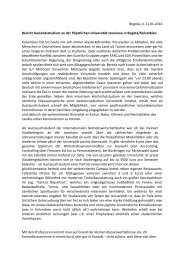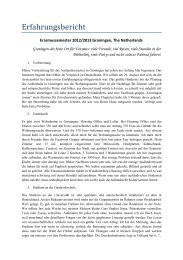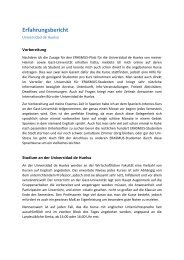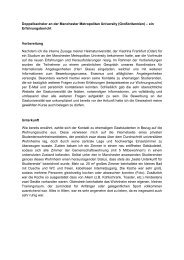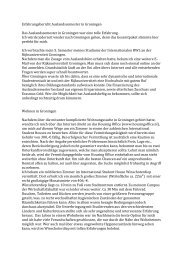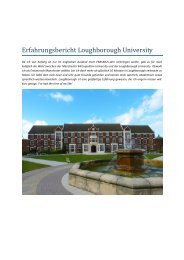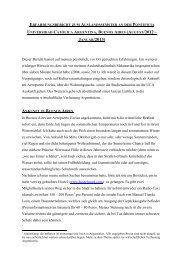Dariusz Aleksandrowicz Aleksandrowicz - Europa-Universität ...
Dariusz Aleksandrowicz Aleksandrowicz - Europa-Universität ...
Dariusz Aleksandrowicz Aleksandrowicz - Europa-Universität ...
You also want an ePaper? Increase the reach of your titles
YUMPU automatically turns print PDFs into web optimized ePapers that Google loves.
D. <strong>Aleksandrowicz</strong>: The Socialist City and its Transformation 13<br />
Huta with workers marching in perfect order during the May Day celebrations; in the<br />
last decade of the communist Poland, there were long-term strikes and bloody street<br />
fights that decisively determined the image of the city.<br />
After the collapse of the communist system the new socialist cities - owing to their<br />
dependence on one single, usually inefficient, production plant or one branch of<br />
heavy industry - developed into areas of sharp crisis. In face of the (at least expected)<br />
bankruptcy of this industrial infrastructure these cities became existential<br />
pitfalls, without any attractive future prospects for their inhabitants and particularly<br />
for the younger generation. Discussing these problems, we must, however, note that<br />
limiting the number of behavioural alternatives with respect to the possible spatial<br />
behaviour undertaken on one’s own account, the socialist city at the same time relieved<br />
its inhabitants from the corresponding individual risk. They were therefore<br />
only exceptionally burdened by decisions of the type to go shopping to this or that<br />
shop, to live in this or that neighbourhood etc. To be sure, most of the residents of a<br />
communist country could lead a somewhat “economy-free” life, that is a life substantially<br />
relieved from stress resulting from being confronted by the genuine economic<br />
process. Although they had to come to grips with many economic problems in<br />
their every-day life (as supply shortages or low wages), at their place of labour as<br />
well as with respect to the basic conditions of life they were free from pressure and<br />
from uncertainty due to the market economy and the competitive system.<br />
In Communism, the all-round control was the reverse of the all-round support the<br />
state offered to the system-conforming individual. Owing to the disintegration of the<br />
communist system the people had to live progressively in an economy-related reality.<br />
Finally, even at their place of work and in their extremely important relation to<br />
the production plant they became dependent on the economic process. This very<br />
situation was completely alien to their previous experience, hierarchy of values and<br />
way of life. They, therefore, often lacked orientation and appropriate behavioural<br />
patterns to come to grips with the changed conditions of work and of life. The expected<br />
bankruptcy of the production plant means for the inhabitants of the new socialist<br />
city not only unemployment but also a collapse of what they regarded to be<br />
“normal” and “just”, and what they were used to live in. This situation causes frustrations<br />
and tensions which strengthen the already existing potential of aggression<br />
and anarchistic populism. Now, however, it is the authority of the democratic state,<br />
the system of free enterprise and the market economy that are the, more or less consciously<br />
defined, targets of striking and rioting workers of the post-socialist production<br />
plants. In doing it, the workers try again to exert collective aggression as a<br />
means of finding escape from the difficulties of their individual lives. 25<br />
few bomb attacks), whereas on the other hand the official authority finally gave in to the pressure<br />
exercised by the local bishop as well as by the workers of the steel plant and allowed a big church<br />
building to be legally erected in the middle of the city.<br />
25 Admittedly, this type of destructiveness is not a primary psychological attitude of individuals but<br />
is to be understood as an attempt to master some related problems due to a specific social con-



